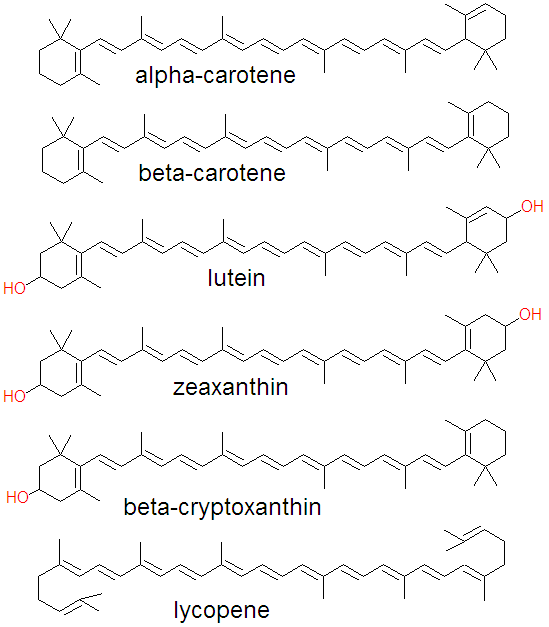Carotenoid: Difference between revisions
Jump to navigation
Jump to search

imported>David E. Volk mNo edit summary |
imported>Meg Taylor m (spelling: suppliment -> supplement) |
||
| (One intermediate revision by one other user not shown) | |||
| Line 1: | Line 1: | ||
{{subpages}} | {{subpages}} | ||
'''Carotenoids''' are a group of naturally occurring [[phytochemical]]s that are structurally related to [[alpha-carotene]]. They are [[antioxidant]]s with a number of health benefits and mostly found in fruits and vegetables. The combined concentrations of [[lutein]] and [[zeaxanthin]] are generally higher than the concentrations of the [[carotene]]s in most food sources.<ref>{{cite journal | journal = Journal of the American College of Nutrition | title = Lutein and Zeaxanthin and Their Potential Roles in Disease Prevention | authors = J.D. Ribaya-Mercado and J.B. Blumberg | volume = 23 ( | '''Carotenoids''' are a group of naturally occurring [[phytochemical]]s that are structurally related to [[alpha-carotene]]. They are [[antioxidant]]s with a number of health benefits and mostly found in fruits and vegetables. The combined concentrations of [[lutein]] and [[zeaxanthin]] are generally higher than the concentrations of the [[carotene]]s in most food sources.<ref>{{cite journal | journal = Journal of the American College of Nutrition | title = Lutein and Zeaxanthin and Their Potential Roles in Disease Prevention | authors = J.D. Ribaya-Mercado and J.B. Blumberg | volume = 23 (Supplement 6) | pages = 567S | year = 2004 }}</ref>. | ||
While both [[alpha-carotene]] and [[beta-carotene]] are precursors of [[vitamin A]], [[lutein]] and [[zeaxanthin]] are not. However, the hydroxyl groups of lutein and zeaxanthin make the chemicals more hydrophilic than the carotenes so that they can react with singlet oxygen radicals in water. | |||
Latest revision as of 04:32, 14 February 2010
Carotenoids are a group of naturally occurring phytochemicals that are structurally related to alpha-carotene. They are antioxidants with a number of health benefits and mostly found in fruits and vegetables. The combined concentrations of lutein and zeaxanthin are generally higher than the concentrations of the carotenes in most food sources.[1].
While both alpha-carotene and beta-carotene are precursors of vitamin A, lutein and zeaxanthin are not. However, the hydroxyl groups of lutein and zeaxanthin make the chemicals more hydrophilic than the carotenes so that they can react with singlet oxygen radicals in water.
References
- ↑ (2004) "Lutein and Zeaxanthin and Their Potential Roles in Disease Prevention". Journal of the American College of Nutrition 23 (Supplement 6): 567S.
